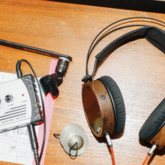The article was published in Stim-magasinet #1 2017
You can’t help but be intrigued.
Small, slender and as lovely as an angel, but with so much power, force of will and determination,Laleh is a combination that both fascinates and works.
“I try to see it as a strength to be able to preserve my fragility.I always try to take a step back from myself and see myself from outside with more perspective,” says Laleh, who has enriched the US music world over the last three years by writing and producing for others. In late autumn, however, she was at home in Sweden with a new album and tour. She also took the opportunity to receive Stim’s Platinum Guitar.
When Stim’s CEO Karsten Dyhrberg Nielsen handed over the prize, he had no trouble coming up with superlatives.
“Laleh is an impressive musician who has shown time after time – with her meticulously honored productions and lyrics – that she completely transcends and renews every branch of the musical craft that she engages in.She makes the world of music more beautiful.”
Laleh knows what she wants – she marks out her own paths, and always has.And she has managed, in her own natural way, to break the male-dominated nature of the music industry.
Even when she was making her debut album at the age of 23, she was already demanding to produce it and do everything herself.She put everything into it – in terms of time as well as money – and it worked.
And so it has continued. The fact that she follows her own path also means that everything she does is absolutely genuine. 100 per cent Laleh.
“I think the audience can feel it when there is a genuine curiosity for music.”
It all comes down to hard work and a yearning to put words to things without destroying them.
But where does all this determination come from?
“I don’t really see myself that way. But I understand what people mean and sometimes I am reminded. Like when I saw an old film clip from when I was 15 years old in the documentary ‘Jag är inte beredd att dö än’ (‘I’m not ready to die yet’). I thought, ‘Wow! Where did I get that energy from?’ I don’t remember being as assertive as that at all – even then. It was kind of interesting to see.”
Now we know that her strength and power comes from all the love she received from her parents.
“It is a gift that I am very grateful for.”
Laleh also seems to be completely unafraid. When she was 17, Laleh played the role of Yasmine in Josef Fares’s successful film “Jalla Jalla”, but despite receiving high praise she had no plans to continue on the acting path. She “only” took the film role to earn money for a saxophone she really wanted. She then set herself new goals and, only a few years later, her music career took off in earnest.Laleh scooped up three Grammies and two P3 Guld awards, and received huge acclaim as the country’s new shining star.
Then she suddenly left all the excitement and moved to the woods outside Skellefteå.How many young girls would do that? Didn’t it ever occur to you that you might have destroyed your chances there and then?
“No, not really,” she says with a big smile and a slightly surprised look, as if she still hadn’t quite taken in the idea that it was an odd move.
“When I went to Skellefteå I had published two albums and I thought I was done with songwriting. I thought it was time for the next step, and that I should dedicate myself to art or something like that instead.”
The same pattern repeated itself each time she finished an album.
“Every time, I think I am done with songwriting – because I’m done with putting words to that feeling. But then a new feeling, thought or idea turns up and the joy and the playfulness of music is awakened again.
“But now I’ve actually managed to see through myself and I’ve ‘given up’.I’ve realised that I’ll never stop writing or being creative.”
It is possible that a meditation course had something to do with it.
“For ten days, we were supposed to learn to let go of everything and we weren’t allowed to speak or write.We were just supposed to focus on breathing. Then, when the course was over, I felt such an enormous sense of gratitude and love of life – a joy at being able to decide for myself what I wanted to do.It was a relief.The main lesson from those ten days of meditation was, in other words, the insight that I can’t be without my writing. I need to be able to write down my thoughts.”
But where does the songwriting come from? Do you remember how it started?
“The poetic has always been there, as a means of expression. It is and was a tool for dealing with life – even as a child.When I was as young as 4–5, I was sad that my parents would die one day and that my life would end too. I cried and cried and I was never able to reconcile myself with that thought.”
Death is also a recurring theme in her lyrics.Laleh was born in Iran during the revolution, and was not even one year old when she and her parents fled to Minsk, in what was then part of the Soviet Union and is now Belarus. A few years later they had to get even further away, and ended up in Hammarkullen outside Gothenburg.
“I’ve lived a rather strange life, in that we were on the run until we got to Sweden when I was eight. Or really even until I got my residence permit when I was 12–13.
“But I am still more interested in the future than in what has already happened. Where do we get our strength from? Is it from hope? For myself, I don’t know, but I think it’s interesting to think about what makes us who we are.”
Her biological inheritance has probably also influenced her songwriting a little.There have been many poets on her father’s side.
“We are an unusually psychologically poet-smitten family, so I have probably inherited that. But it’s my mother’s influence that brought it out in me, so that I didn’t just disappear into my own world. She encouraged me to write my songs down so that they wouldn’t be forgotten or disappear.
“I remember when we were on a summer camp together with several other Iranian families and at one point I was playing one of the songs I had written. My mother got a shock – she didn’t know I wrote music. I think it was a song about Sleeping Beauty not having to wait for the prince. Haha, I was a bit of a feminist even then. I got that from my mother. She always said that I could make it on my own and that I didn’t have to get married.”
Laleh has always written songs in both Swedish and English, and she doesn’t see anything strange in that.
“On the contrary, I don’t understand how people can manage to write in just one language. I would be being dishonest to myself if I didn’t write in both languages. Of course, I spoke English before I could speak Swedish – I used to listen to English and Persian songs as a child.”
In her first three albums, Laleh also includes a number of songs in Persian.
“But I’ve stopped doing that now – out of respect for the Persian language. It is so large and rich, and my Persian is still at a teenage level.”
She has not yet worked out what it is that determines which language she uses.
“There are various different frames of reference controlling it, I think. The songs quite simply come to me intuitively.It is often about wanting to put words to a feeling or a thought.”
Several of her songs have choruses that are reminiscent of battle anthems.But she is not sure whether that comes directly from her upbringing and her politically active parents.
“It’s not something I created intentionally. We didn’t listen to that kind of music at home; it’s just something that developed in my head.
“On the contrary, my mother didn’t want me to dedicate myself to politics. She believed that our family had already given and sacrificed enough for politics.
Laleh’s father drowned in an accident when she was 12, and her mother died a few years ago. That means Laleh is the only one left in her immediate family, since her only sibling, a brother, died before the family fled Iran –maybe even before Laleh was born.
“I’m actually not sure, but I suppose so.We never talked about it and I forgot to ask my mother before she died.But my song ‘Storebror’ (‘Big Brother’) is about him – the way I imagine he was or would have been.
“I usually feel spoiled when I whine about things. That’s why I haven’t talked much about sad things, like how I miss my mother.Instead, I’m trying now to learn to look at existence in a positive way. Different cultures see life, death and grief in different ways and I am trying to keep that in mind.
After her mother’s death, Laleh took the opportunity to take on new challenges. She moved to Los Angeles to write and produce music for global artists like Demi Lovato, Ellie Goulding, Shawn Mendes and Adam Lambert.All of them are big commercial artists associated with Max Martin.But she has worked with them the way she has always done – independently and with the big picture in full view.
In 2016, after three years in the US, she has gone back to writing and producing her own songs. In September, Laleh released her sixth album, “Kristaller” (“Crystals”), and followed it up with a month-long arena tour round Sweden.But her own view is that she is a songwriter and producer first, and an artist second.
“I started singing my own songs mostly for practical reasons in the beginning.Someone had to put them forward, and it was easiest for me to do it. But I really like going on tour and performing. And above all, I love producing my tours.”
Text: Pia Runfors Photo: Lost Army
Laleh Pourkarim
Age:34
Lives in: Los Angeles
Career in brief: made her debut as an artist with the album “Laleh” (2005), which won a number of awards including three Grammies.Since then, she has written and produced the albums “Princessor” (“Princesses”, 2006), “Me and Simon” (2009), “Sjung” (“Sing”, 2012), “Colors” (2014).In 2011, Laleh worked on the TV4 production “Så mycket bättre” (“So Much Better”).
Current projects: her sixth album “Kristaller” (“Crystals”), and work as a songwriter and producer for artists including Adam Lambert, Demi Lovato, Ellie Goulding, Tori Kelly and Shawn Mendes.In November 2016, she received Stim’s Platinum Guitar award 2016.


